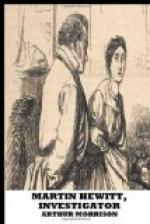“Very well! Eleven months ago, or thereabout, I had rather a large party of visitors, and among them Colonel Heath and Mrs. Heath—the lady being a relative of my own late wife. Colonel Heath has not been long retired, you know—used to be political resident in an Indian native state. Mrs. Heath had rather a good stock of jewelry of one sort and another, about the most valuable piece being a bracelet set with a particularly fine pearl—quite an exceptional pearl, in fact—that had been one of a heap of presents from the maharajah of his state when Heath left India.
“It was a very noticeable bracelet, the gold setting being a mere feather-weight piece of native filigree work—almost too fragile to trust on the wrist—and the pearl being, as I have said, of a size and quality not often seen. Well, Heath and his wife arrived late one evening, and after lunch the following day, most of the men being off by themselves—shooting, I think—my daughter, my sister (who is very often down here), and Mrs. Heath took it into their heads to go walking—fern-hunting, and so on. My sister was rather long dressing, and, while they waited, my daughter went into Mrs. Heath’s room, where Mrs. Heath turned over all her treasures to show her, as women do, you know. When my sister was at last ready, they came straight away, leaving the things littering about the room rather than stay longer to pack them up. The bracelet, with other things, was on the dressing-table then.”
“One moment. As to the door?”
“They locked it. As they came away my daughter suggested turning the key, as we had one or two new servants about.”
“And the window?”
“That they left open, as I was going to tell you. Well, they went on their walk and came back, with Lloyd (whom they had met somewhere) carrying their ferns for them. It was dusk and almost dinner-time. Mrs. Heath went straight to her room, and—the bracelet was gone.”
“Was the room disturbed?”
“Not a bit. Everything was precisely where it had been left, except the bracelet. The door hadn’t been tampered with, but of course the window was open, as I have told you.”
“You called the police, of course?”
“Yes, and had a man from Scotland Yard down in the morning. He seemed a pretty smart fellow, and the first thing he noticed on the dressing-table, within an inch or two of where the bracelet had been, was a match, which had been lit and thrown down. Now nobody about the house had had occasion to use a match in that room that day, and, if they had, certainly wouldn’t have thrown it on the cover of the dressing-table. So that, presuming the thief to have used that match, the robbery must have been committed when the room was getting dark—immediately before Mrs. Heath returned, in fact. The thief had evidently struck the match, passed it hurriedly over the various trinkets lying about, and taken the most valuable.”




